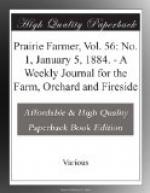FRUIT GROWERS AND FRUIT SELLERS.
Mr. Ragan, of Indiana, read a suggestive paper upon the relation of the fruit-grower to the commission man and the transportation companies. The paper led to considerable discussion. Mr. Earle always sells his fruit through a commission house. Without the commission men market-fruit growers could not do business. He found no difficulty in getting honorable men to do business with. When he got a good man he stuck to him. The commission man is just as important a factor in the fruit business as the grower or consumer. He believes in a liberal percentage for commissions. Dealers can not do an honest business for nothing. He is willing to pay ten per cent to the man who sells his fruit to the best possible advantage, and who makes prompt and honest returns. The cheap commission man is to be avoided. The proper handling of fruit by intelligent dealers at fair rates is what we want. He ships small fruits in full quart boxes. Uses new boxes every time. Wants no returned crates. To get best returns we must have neat packages. Stained drawers, baskets, old barrels, and the like do not help to sell fruit. He would advise shipping black and red raspberries in pint boxes; blackberries and strawberries in quart boxes. He picks his berry plantations every day during the ripening season. Sundays not excepted. No man who is not prepared to work seven days in the week during the picking season, or who can not get help to do the same, will succeed in the raising and marketing of small fruits. He has this year paid two cents per quart for picking blackberries and strawberries, and the same for pints of raspberries. It requires from five to ten pickers to the acre. He likes women or grown-up girls to do this work. As to varieties he likes Longfellow and Sharpless. They ripen slowly and everyday picking is not so necessary. Mr. Pearson said the apple growers in his locality find that judgment must be used in marketing apples. The Lord made little apples and we must do the best we can with them. A neighbor had small apples and the shippers grumbled at them. The neighbor would not stand this and shipped his apples to Chicago and had them




